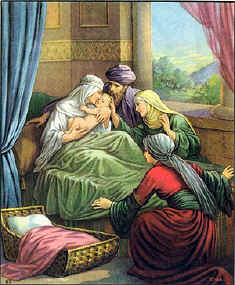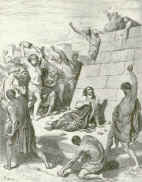
The
Women
of Exodus
with an addition of the one woman of Leviticus

Close this window to return to previous page.
- or -
Click HERE to go to the list of lessons for this course.
LESSON EIGHT
WOMAN TWENTY-TWO

Shelomith
The woman who bore a blasphemer.
Instructions: Remember that you are to read every scripture referenced in this and all other studies in your KJV Bible. And that requirement includes whole chapters that are referenced.
READ: Lev 24:10-13, 23.
|
I. |
Shelomith was the daughter of Dibri, of the tribe of Dan. (Lev 24:11) |
|
| Shelomith means "peaceful." | ||
|
II. |
She was married to an unnamed Egyptian. (:10a) (See "D." below.) |
|
| A. This kind of marriage was warned against under both Law and Grace. (II Cor 6:14, 15) | ||
| B. The children of such a marriage will always be torn between the beliefs of the mother and the beliefs of the father. | ||
| C. In this marriage the two competing beliefs were belief in Johovah, the God of the mother, Shelomith. and the gods of Egypt in whom the father believed. | ||
|
|
||
|
Jewish Legend: From the Jewish Midrash the Aggadah and other sources, various Rabis put forth the story (we would call it legend because it is not supported in any manner from the Bible) that Shelomith either willingly lay with the Egyptian taskmaster while her husband was at his labors and conceived a son or, in some of the stories, that this sexual coupling was forced upon her while her husband was away. The legend claims that the Egyptian had beaten her husband, or killed him depending on
who is commenting on the story, either as a consequence of, or as a prelude to,
having sexual relations with Shelomith. Moses was claimed to have witnessed the beating of the husband by the Egyptian taskmaster (in the story where the Egyptian's relations with Shelomith took place first) and, in turn, killed the Egyptian; executing as it were, a death penalty upon the Egyptian in just penalty for his sins against both Shelomith and her husband. This Egyptian is supposedly the Egyptian referred to in Ex 2:11 that Moses killed in Egypt before fleeing to Midian. According to Lockyer the ancient Chaldee version of the Old Testament agrees with this legend: "A wicked man, a rebel against the God of Heaven, had come out of Egypt, the son of the Egyptian who slew an Israelite in Egypt, and outraged his wife, who conceived and brought forth this son among the children of Israel." From an online article by Tamar Kadari on the Jewish Women, A Comprehensive Historical Encyclopedia site comes another twist on the story from the Rabbis: "A number of midrashim stress that although Shelomith’s son was the child of an Egyptian man, she was not married to her son’s father, and the entire incident is presented (from her perspective) as a sorry mistake. The Egyptian taskmasters would wake the Hebrews at the crack of dawn every morning for their slave labor. To do this, the taskmasters would enter the houses of the Israelites. When one of the taskmasters entered Shelomith’s tent, he was struck by her beauty and desired her. One dawn, after the taskmaster had sent her husband to his daily labor, he returned to Shelomith and lay with her; in the darkness, Shelomith thought that he was her husband. When Shelomith’s husband returned, he saw the Egyptian taskmaster leaving his house. He asked her: “Did he touch you?,” to which she replied: “Yes, and I thought that was you” (Ex. Rabbah 1:28)." These are interesting stories; however, keep in mind that they are just stories. We must consider them legend or myth because there is no biblical support for any of them. Could they have happened? That is a possibility. Did they happen? Without biblical corroboration we cannot say one way or the other. |
||
|
D. |
Married, unmarried, or adultery? Most believe that she had married the Egyptian and bore a son to him and much of this study is based on that belief. However, the fact is that the Bible does not say whether she had married him or not. That she had married him is only an assumption made by most. 1. Unmarried. If she had been raped, which a few of the Rabis claim, then her son was a product of that violent encounter. In that scenario, his violent conception was but a prelude to, and possibly a foretelling of, his violent temper which caused him to blaspheme the God of Heaven and meet such a violent end. |
|
|
2. Married. By far, the majority of literature written on Shelomith is by those who believe that she did marry the Egyptian. The current study's admonition against marriage between believers and unbelievers is predicated upon that belief. From the same article by Tamar Kadari quoted above: "The Rabbis maintain that the phenomenon during the Egyptian servitude of Israelite women being married to Egyptians was rare, and the specific mention of the forging of such a bond with Shelomith teaches how exceptional this instance was." |
||
| 3. If she was a partner to adultery, that later led to the death of her husband, then the story would parallel that of David and Bathsheba with but a small arrangement of the details and the sequence. The end result, however, would be the same in both stories- the death of the child conceived through the adulterous relationship. For David and Bathsheba, the death was at the birth of the child. For Shelomith and the Egyptian, the death was some years after the child's birth. Probably at least 20 years for the death penalty to be exacted upon the son. But in the end the result is the same for both products of the adulterous relationships. Maybe there were different reasons for the deaths, but death is death no matter what the reason. | ||
|
III. |
Her son was stoned to death as the first convicted blasphemer under The Law. (Lev 24:10-16, 23) |
|
|
|
|
|
| Why he cursed God we are not told. The Bible is silent on the point. However Jewish tradition gives two interesting possiblities. | ||
| A. |
According to one tradition the son had tried to mend his ways and converted to Judaism and wanted to pitch his tent within the encampment of Dan with his tribe . They asked him why and he told them he was "of the daughters of Dan." They answered that Scripture said that each was to pitch his tent with those of his "father's" house, not his mother's house. Since his father was not a Danite then
he could not encamp with them. Angered, he went to Moses to have a judgement made and the tradition has it that Moses knew that he was a mamzer (a bastard) and judged that he could not camp with the Danites because his father was not Danite. The son then stormed off and blasphemed the name of God. (Sifra 14:1-2) According to Tamar Kadari: "This midrash is highly critical of the conduct of Moses and the Danites. Shelomith’s son tried to mend his ways: he converted and wanted to be part of his tribe, but they cast out the “Other” from their midst on the flimsiest of excuses. His isolation within society and the unwillingness of his tribe to accept him drove him to the extreme act of blasphemy, which resulted in his death." |
|
| B. | "A different tradition, however, praises Moses’s conduct in this situation. Moses knew that the son was a mamzer, but he did not divulge this to a soul, until the truth came out on its own during this episode (T Eduyot 3:4)." | |
| C. | Both of these stories are, once again, a matter of myth or legend because there is no biblical corroberation for their existence or truthfulness. | |
| Summary: | ||
| 1. | From the story of Shelomith we learn that we need to teach our children not to blaspheme. It is a very serious matter. | |
| 2. |
We also learn that mothers need to teach their children to not lose their temper; and that doing so, even in the midst of a fight, is still not an excuse for taking the name of the Lord in vain. |
|
| 3. | Thirdly we can learn that mothers need to teach their children that taking the name of the Lord in vain is one of the most serious of sins; in fact, it is much more serious than fighting. Losing control of the tongue is the sign of an uncontrolled person. Read all of James chapter 3. | |
| Jas 3:6 "And the tongue is a fire, a world of iniquity: so is the tongue among our members, that it defileth the whole body, and setteth on fire the course of nature; and it is set on fire of hell." | ||
| 4. |
Last of all we can learn from this woman's story that we ought not to disobey God and marry outside of the people of God. Even if Shelomith respected the name of God, it was not likely that her Egyptian husband did. And you will find that the boys generally follow dad unless the mother is strong, adamant, and zealously consistent in the training of the sons in the ways of God. She can counteract the bad influence of the
heathen father but it is extremely hard to do so. The best course is to not ever marry a heathen (unbeliever) in the first place. God forbad it in the Old Testament because the usual result was that the heathen pulled God's people away from Him and into idolatry and other sin. (Ex 34:12-16; Deut 7:3-4; Josh 23:11-13; Neh 13:23-27) God also forbad it in the New Testament. (II Cor 6:14, 15) This story of Shilometh shows the truth of that biblical precept and the consequences of disobeying it. |
|
| Application for us: | ||
| For us today we can apply the same lesson to us as Christians today. We are forbidden to join ourselves to an unbeliever, in marriage or any other union; and we need to teach our children the same precept. If both parents are Christian then the child will be raised with the proper respect for God and His name; but, if one of the parents is unsaved then that one will pull the whole family down to his or her level and whoever falls will have to suffer the consequences. | ||
| If we do not want to suffer and grieve as I'm sure Shelomith did when her son suffered the supreme consequence of his actions, whether learned from her or from his father makes no difference in the end, then we need to train up our children to respect God and his rules and to make sure the child has the proper training, discipline, and encouragement, by example, from BOTH parents; not just from one of them! (Prov 22:6,15; 29:15; II Cor 6:14-18) | ||
|
|
||
|
LESSON EIGHT TEST If you fail this test then you must wait a minimum of one day before you can Close this window to return to previous page. |
||